-

-
-
Loading

Loading

Tech billionaire Elon Musk announced that his company, Neuralink, has successfully implanted its wireless brain chips in a human for the first time. The initial results showed promising neuron activity and the patient is recovering well. Neuralink's ultimate goal is to connect human brains to computers in order to address complex neurological conditions. Several rival companies have already implanted similar devices. Neither Neuralink nor the Food and Drug Administration (FDA) have commented on the development as BBC News has reached out for further information. In May, Neuralink received FDA permission to test the chip on humans, marking a significant milestone after previous struggles to gain approval. The company is conducting a six-year study in which a robot is being used to surgically place thin, flexible threads onto a specific area of the brain associated with movement intention. These threads allow the experimental implant, powered by a wirelessly chargeable battery, to record and transmit brain signals wirelessly to an app that decodes the user's intended movements. Musk revealed on social media platform X (formerly known as Twitter) that Neuralink's first product would be called Telepathy, enabling control of devices through thought alone. Initial users of Telepathy would be individuals who have lost the use of their limbs. Musk also mentioned Stephen Hawking, highlighting the potential for faster communication with the technology. While Neuralink gains attention through Musk's involvement, it faces competition from other companies, including Blackrock Neurotech and Precision Neuroscience, both focused on assisting people with paralysis through brain-computer interfaces. These companies have developed their own implantable devices, with Precision Neuroscience using a simpler procedure involving a thin piece of tape placed on the brain's surface. Recent scientific studies in the US have shown that implants can monitor brain activity involved in speech, offering possibilities for decoding thoughts to aid communication.